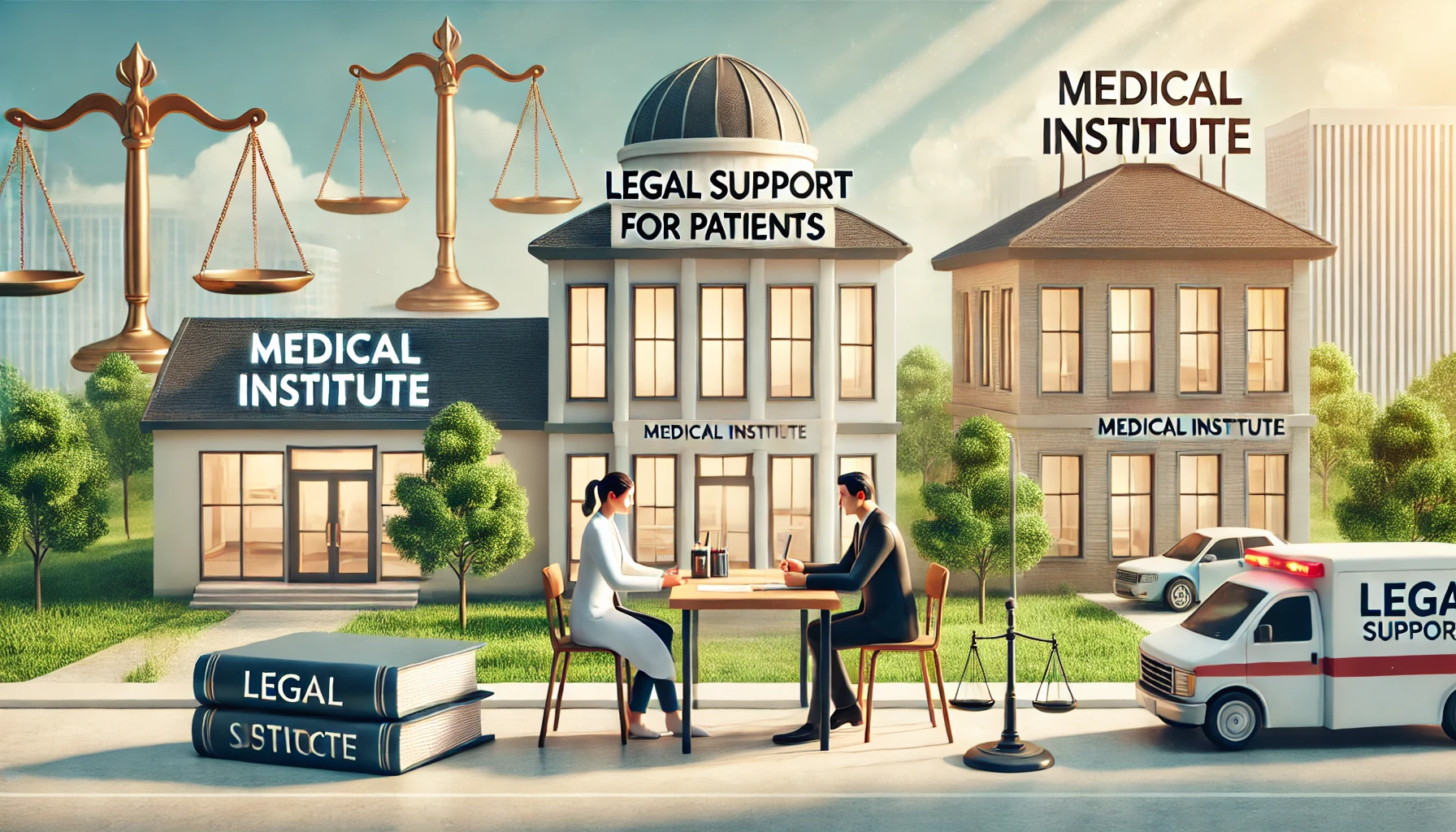The Total Health Institute lawsuit has drawn attention due to allegations surrounding the practices and treatments offered by the health institute. This case highlights the importance of transparency and patient rights in the alternative health and wellness industry, sparking discussions about regulatory standards in such institutions. As patients become more proactive about their healthcare choices, legal cases like these emphasize the need for clear guidelines.
At the core of the Total Health Institute lawsuit are claims related to patient safety, the effectiveness of treatments, and whether the institute’s methods align with established medical standards. These concerns underscore the balance health providers must maintain between offering alternative therapies and adhering to established health regulations. With more individuals turning to alternative health services, lawsuits like this serve as a reminder for the industry to prioritize patient welfare.
The Total Health Institute lawsuit also raises questions about accountability within alternative medicine. Patients seek care they can trust, especially when traditional treatments have not met their needs. This case brings into focus the need for comprehensive patient education and informed consent, ensuring that individuals understand the potential risks and benefits before undergoing treatments.
Legal Grounds and Allegations in the Total Health Institute Case
The Total Health Institute lawsuit centers on allegations that question the safety, efficacy, and legitimacy of the treatments offered by the institute. These claims include assertions that some therapies may have been promoted without sufficient evidence of their effectiveness, potentially putting patients at risk. Legal experts argue that healthcare providers must adhere to established medical standards, especially when alternative treatments are involved.
Some of the key allegations in the Total Health Institute lawsuit pertain to the marketing of treatments as effective cures for serious illnesses. Critics claim that these practices may have misled patients who were seeking alternative solutions. These types of allegations can impact not only the patients but also the credibility of alternative health services broadly.
Another focal point is whether patients were fully informed about the treatments they received. The lawsuit contends that, in some cases, patients may not have received adequate information about potential risks and outcomes. This raises important questions regarding informed consent, a fundamental legal requirement in all healthcare settings.
- Bullet Points on Allegations:
- Marketing treatments without substantial clinical evidence
- Questions around patient informed consent
- Potential risks associated with promoted therapies
- Impact on vulnerable patients seeking alternative care
Finally, the Total Health Institute lawsuit highlights the legal boundaries within which health institutes operate, especially those offering non-conventional treatments. This case could lead to stricter oversight of alternative health providers to protect patients and ensure treatments align with recognized health standards.
How Medical Institutes Handle Lawsuits: A Closer Look
In cases like the Total Health Institute lawsuit, medical institutes typically rely on legal and PR teams to manage the situation and maintain trust among their clients. They may begin by conducting an internal review to assess and document the accuracy of their practices and services. This step is crucial in establishing transparency, as any lapse in compliance can escalate legal repercussions.
One common response to lawsuits is to reassess patient communication strategies, ensuring that informed consent practices are thorough. If informed consent was a point of contention in the Total Health Institute lawsuit, the institute might need to implement stronger protocols for disclosing risks and treatment limitations to clients.
To protect their reputation, institutes facing lawsuits often release statements to the public clarifying their stance. In some cases, institutes may settle out of court to avoid prolonged litigation. However, this approach can have financial implications and may still impact the institute’s image.
Institutes also typically update training and compliance programs for staff. These updates help mitigate future legal risks by ensuring that all personnel adhere to legal and ethical guidelines in patient care. This step is particularly relevant for the Total Health Institute lawsuit, as patient trust is paramount in health services.
Ultimately, legal proceedings may lead institutes to adjust their business practices or the types of services they offer. For instance, in light of the Total Health Institute lawsuit, some alternative health providers may re-evaluate their treatment offerings to comply more closely with mainstream medical standards.
The Role of Patient Rights in Medical Litigation
The Total Health Institute lawsuit brings patient rights into sharp focus, particularly in the context of alternative health treatments. Patients have the fundamental right to make informed decisions about their healthcare, which includes full disclosure of risks and benefits. Legal standards require that healthcare providers ensure patients understand the procedures they undergo, a principle known as informed consent.

When patient rights are at stake, lawsuits often examine whether a provider’s practices align with legal and ethical standards. In the Total Health Institute lawsuit, questions about the adequacy of informed consent procedures reflect broader concerns within healthcare about ensuring patients’ autonomy and safety. This is especially relevant in non-traditional health settings, where patients may not be as familiar with the types of treatments being offered.
A critical aspect of patient rights in medical litigation is the right to quality care. If the Total Health Institute lawsuit identifies any negligent practices, it could prompt the institute to improve its standards to prevent future cases. Healthcare providers are legally obligated to uphold a standard of care, and any deviation can lead to significant legal consequences.
- Patient Rights in Litigation:
- Informed consent and transparent communication
- Right to quality and safe treatment
- Autonomy in healthcare decisions
- Legal recourse in cases of negligence
The outcome of the Total Health Institute lawsuit may influence the policies of other health institutes, especially those providing alternative care. By addressing patient rights within this case, the industry may see an increased emphasis on patient-centered practices across similar institutes.
Total Health Institute Lawsuit: Implications for Alternative Health Providers
The Total Health Institute lawsuit has potential ramifications for the broader alternative health industry. It underscores the need for providers to balance innovative treatments with evidence-based practices to ensure patient safety. Alternative health providers may face increased scrutiny to substantiate their treatment claims, particularly when dealing with serious health conditions.
This case highlights a potential shift toward tighter regulations within the industry. In the wake of the Total Health Institute lawsuit, governing bodies may adopt more rigorous standards to ensure alternative treatments meet a minimum efficacy threshold. This could affect how alternative health providers market and deliver their services to patients.
For many providers, the lawsuit serves as a reminder to enhance their transparency with patients. This includes disclosing both the benefits and limitations of alternative treatments. If the Total Health Institute lawsuit demonstrates a lack of transparency, it may prompt other providers to review their patient information protocols.
A key takeaway for alternative health providers is the importance of thorough documentation in patient care. Proper records help demonstrate that patients receive adequate information about their treatments. If the lawsuit establishes precedent, documentation may become an essential defense tool for other providers facing legal challenges.
The Total Health Institute lawsuit also signals a growing awareness among patients about their rights to alternative healthcare. As patients become more informed and discerning, providers may find themselves under greater pressure to adhere to established medical standards while also offering innovative care.
Exploring the Legal Framework for Health Institutes
The legal framework governing health institutes is multifaceted, incorporating both federal and state-level regulations. These regulations ensure that health facilities operate ethically and maintain safety standards. The Total Health Institute lawsuit exemplifies how alternative health providers are held accountable under these laws, ensuring that patients receive safe and effective treatments.
Standard of care is a primary requirement in this framework. Health providers, including alternative institutes, are legally obligated to meet a certain level of care. For cases like the Total Health Institute lawsuit, determining whether the institute met or deviated from this standard is crucial, as it affects the legitimacy of treatments offered.
Informed consent is another cornerstone of healthcare law. All healthcare facilities, especially those offering non-traditional treatments, must disclose treatment risks and outcomes transparently. The Total Health Institute lawsuit spotlights potential failures in informed consent, emphasizing the need for health institutes to thoroughly communicate treatment details.
Key Elements of Legal Framework in Health Institutes:
| Element | Description |
| Standard of Care | Mandates level of care provided by institutes |
| Informed Consent | Requires clear disclosure of risks and benefits |
| Advertising Laws | Restricts misleading promotional claims |
| Record-Keeping | Ensures all treatments are documented |
Health institutes are also bound by advertising laws, which prevent them from making unfounded claims about treatment efficacy. In the Total Health Institute lawsuit, examining these claims could reveal whether promotional practices were misleading, potentially violating legal standards.
Impact of Lawsuits on Health and Wellness Institutions
Lawsuits can significantly affect health and wellness institutions by altering public perception, reducing patient trust, and introducing financial strains. The Total Health Institute lawsuit serves as an example, highlighting the immediate and long-term impacts litigation can have on such facilities. Rebuilding trust and ensuring compliance becomes paramount for institutes under scrutiny.
Financial burdens from lawsuits can be substantial. Legal fees, settlements, and possible fines are common, and these expenses can strain resources. For the Total Health Institute lawsuit, financial implications could lead to cutbacks or changes in offered services, reflecting the strain lawsuits place on alternative health providers.
Beyond finances, lawsuits may prompt changes in operational policies. Health institutes facing litigation often re-evaluate their consent practices, treatment guidelines, and marketing strategies to align with legal standards. The Total Health Institute lawsuit could drive the institute to implement stricter internal policies to prevent future legal challenges.
Potential Impacts of Litigation on Health Institutes:
- Financial strain from legal fees and settlements
- Policy revisions to improve compliance
- Increased regulatory scrutiny and audits
- Reputational damage affecting patient trust
Lawsuits can also bring about regulatory scrutiny, leading to licensing reviews and inspections. The Total Health Institute lawsuit may trigger a closer examination by regulatory bodies, affecting the institute’s future operations and compliance obligations.
Patient Safety Concerns Raised by the Total Health Institute Lawsuit
The Total Health Institute lawsuit brings critical patient safety concerns to light, particularly in alternative health settings. Ensuring patient safety is essential, as patients trust health institutes to provide treatments that are both effective and safe. The lawsuit raises questions about the effectiveness of the safety measures in place at the institute.

One major aspect is the adequacy of information provided to patients. Properly informing patients about the risks and benefits of treatments is fundamental to safety. The Total Health Institute lawsuit highlights possible gaps in communication, stressing the need for clear and accurate patient education.
Another important factor is the quality and reliability of alternative treatments offered. Patients seeking these treatments often have limited mainstream options and are vulnerable to ineffective therapies. The lawsuit emphasizes the importance of ensuring that alternative treatments are not only safe but also genuinely beneficial to patient health.
Patient Safety Priorities:
- Clear and comprehensive treatment information
- Reliable and scientifically supported treatments
- Regular safety audits and protocol improvements
- Monitoring for adverse treatment interactions
In light of this lawsuit, patient safety protocols may be revised to better protect clients. Enhanced protocols, such as mandatory safety checks and improved communication strategies, could become standard practice for alternative health providers.
The Role of Evidence in Medical-Related Lawsuits
Evidence is a cornerstone in cases like the Total Health Institute lawsuit, as it determines whether an institute’s practices meet legal standards. Courts rely on extensive documentation and expert testimonies to assess the quality of care. This process underscores the need for clear, factual records in all healthcare settings.
Medical lawsuits typically involve treatment records, informed consent forms, and patient feedback. For the Total Health Institute lawsuit, reviewing these documents helps clarify the institute’s compliance with healthcare laws. The consistency and thoroughness of these records play a crucial role in building a case.
Types of Evidence in Medical Lawsuits:
| Evidence Type | Purpose in Lawsuit |
| Treatment Records | Show patient history and treatment specifics |
| Informed Consent | Demonstrates patient understanding of risks |
| Expert Testimonies | Provide insights into standard practices |
| Patient Feedback | Reflects patient experiences and concerns |
Informed consent documents are especially vital, as they indicate whether patients fully understood the risks associated with their treatments. Any gaps in this evidence could affect the outcome of the Total Health Institute lawsuit.
Lastly, expert testimonies provide a professional perspective on whether the institute’s practices align with industry standards. These insights are valuable in evaluating both conventional and alternative health practices, as seen in the Total Health Institute lawsuit.
Possible Outcomes and Consequences of the Total Health Institute Lawsuit
The Total Health Institute lawsuit could lead to several possible outcomes that impact both the institute and its patients. One outcome might be a settlement, where the institute compensates affected patients without admitting liability. This is a common result in similar cases, allowing institutions to manage legal risks while providing restitution to patients.
If the case proceeds to trial, a court ruling could establish whether the institute’s practices breached legal standards. A judgment against the institute may result in financial penalties, operational restrictions, or even the suspension of certain services. In the Total Health Institute lawsuit, these potential outcomes highlight the severity of the claims and the importance of compliance in alternative health.
Regulatory bodies may also impose stricter oversight on the institute, including periodic audits and additional reporting requirements. Such measures ensure that health providers maintain patient safety and adhere to industry standards. The Total Health Institute lawsuit could prompt changes that affect future operations and treatment practices.
Potential Outcomes of the Lawsuit:
- Financial compensation to affected patients
- Judicial rulings on the institute’s legal responsibilities
- Increased regulatory oversight and compliance checks
- Mandatory operational adjustments
Beyond immediate consequences, the lawsuit may set a legal precedent for alternative health providers, signaling to the industry that non-compliance has serious repercussions. Other institutes may proactively adopt similar standards to avoid litigation, influencing broader healthcare practices.
How Total Health Institute’s Practices Came Under Scrutiny
The Total Health Institute’s practices came under scrutiny following multiple patient complaints regarding treatment effectiveness and safety. Patients reported concerns about the efficacy of alternative therapies, prompting investigations by both legal and health authorities. These initial complaints served as the foundation for the broader legal challenges now facing the institute.
Regulatory bodies began reviewing the institute’s practices to determine compliance with health and safety standards. For alternative health providers, aligning with mainstream safety requirements can be complex. In the case of the Total Health Institute lawsuit, regulators are assessing if the treatments provided meet the required medical and ethical guidelines.
Media attention further amplified the issues surrounding the Total Health Institute’s practices, bringing public awareness to patient claims. With increased media scrutiny, other patients have come forward, potentially expanding the scope of the investigation. Publicized reports often drive attention to previously overlooked patient safety concerns.
A significant factor under review is the institute’s marketing practices, as some claims about treatment success have been labeled as potentially misleading. Health regulations mandate accuracy in promotional content, and violations could result in legal consequences. This aspect of the Total Health Institute lawsuit is critical in determining if patients were misled about treatment outcomes.
Key Scrutiny Areas:
- Treatment efficacy and safety
- Compliance with medical standards
- Accuracy of marketing claims
- Patient feedback and complaints
Lastly, professional organizations in alternative health have taken note of the lawsuit, as it may affect industry-wide standards. The case highlights the importance of transparent practices, pushing similar institutes to re-evaluate their protocols.
Legal Options for Patients Affected by Medical Institutes
Patients affected by cases like the Total Health Institute lawsuit have several legal options to address their grievances. They can pursue individual claims or join class-action lawsuits if multiple patients report similar experiences. These actions allow patients to collectively seek compensation for any harm suffered.

Another option is filing complaints with state health departments or licensing boards. This process can prompt investigations into the practices of health institutes, leading to potential regulatory action. In the Total Health Institute lawsuit, patient complaints to regulatory bodies have already played a significant role in initiating legal proceedings.
Patients may also seek alternative dispute resolution (ADR) methods, such as mediation or arbitration, which can resolve cases more swiftly than traditional court proceedings. These methods are often used in cases like the Total Health Institute lawsuit to achieve fair settlements without lengthy litigation.
Common Legal Paths for Affected Patients:
| Legal Option | Description |
| Individual Lawsuits | Direct compensation for personal harm |
| Class-Action Lawsuit | Group action for widespread issues |
| Filing Complaints | Initiate regulatory reviews and investigations |
| Alternative Dispute | Quick, out-of-court resolution (mediation) |
Finally, patients may seek legal representation from attorneys specializing in medical malpractice or patient rights. These professionals can provide guidance on the best course of action. The Total Health Institute lawsuit may lead to increased awareness of legal resources available for those affected by alternative health practices.
Lessons for Patients and Health Practitioners from the Total Health Institute Case
The Total Health Institute lawsuit offers valuable lessons for both patients and health practitioners in navigating alternative health options. Patients are reminded of the importance of researching health providers, particularly those offering unconventional treatments. Understanding a provider’s background and treatment efficacy is essential to making informed choices.
For patients, the lawsuit emphasizes the need for transparency and informed consent. Patients should ask providers for detailed information on any proposed treatments, including potential risks, benefits, and evidence supporting their effectiveness. The Total Health Institute lawsuit underscores how critical it is for patients to be fully informed.
Practitioners in alternative health can learn the importance of maintaining ethical standards in patient care. Ensuring compliance with industry regulations and safety protocols helps protect both the patient and the practitioner. In light of the Total Health Institute lawsuit, practitioners may seek additional training on legal and ethical guidelines.
Key Takeaways for Patients and Practitioners:
- Importance of informed consent and transparency
- Value of conducting thorough provider research
- Adherence to legal and ethical standards in alternative health
- Building trust through clear, evidence-based communication
Finally, this case illustrates the potential legal repercussions of misleading marketing practices. For health practitioners, honest and accurate advertising is essential to maintain trust. The Total Health Institute lawsuit serves as a reminder that patient welfare should always be prioritized, especially in non-traditional healthcare settings.
Conclusion
The Total Health Institute lawsuit serves as an important case study in understanding the dynamics of alternative health practices and their regulatory obligations. This case highlights the need for all health providers to adhere to strict legal and ethical standards, especially when offering treatments outside of conventional medicine. Ensuring that patient rights are respected and that treatments are evidence-based are essential takeaways from this case.
For patients, the Total Health Institute lawsuit underscores the importance of being well-informed about their healthcare choices. Patients must be proactive in asking questions, understanding treatment risks, and ensuring that they receive full disclosure before proceeding with any non-traditional therapies. This approach helps them make better-informed decisions and safeguards their wellbeing.
The lawsuit also acts as a wake-up call for health and wellness providers to reassess their practices. Providers are encouraged to align their treatment approaches with established medical guidelines and maintain transparency in their patient interactions. Clear communication and documented informed consent are critical to fostering trust and avoiding potential legal issues.

